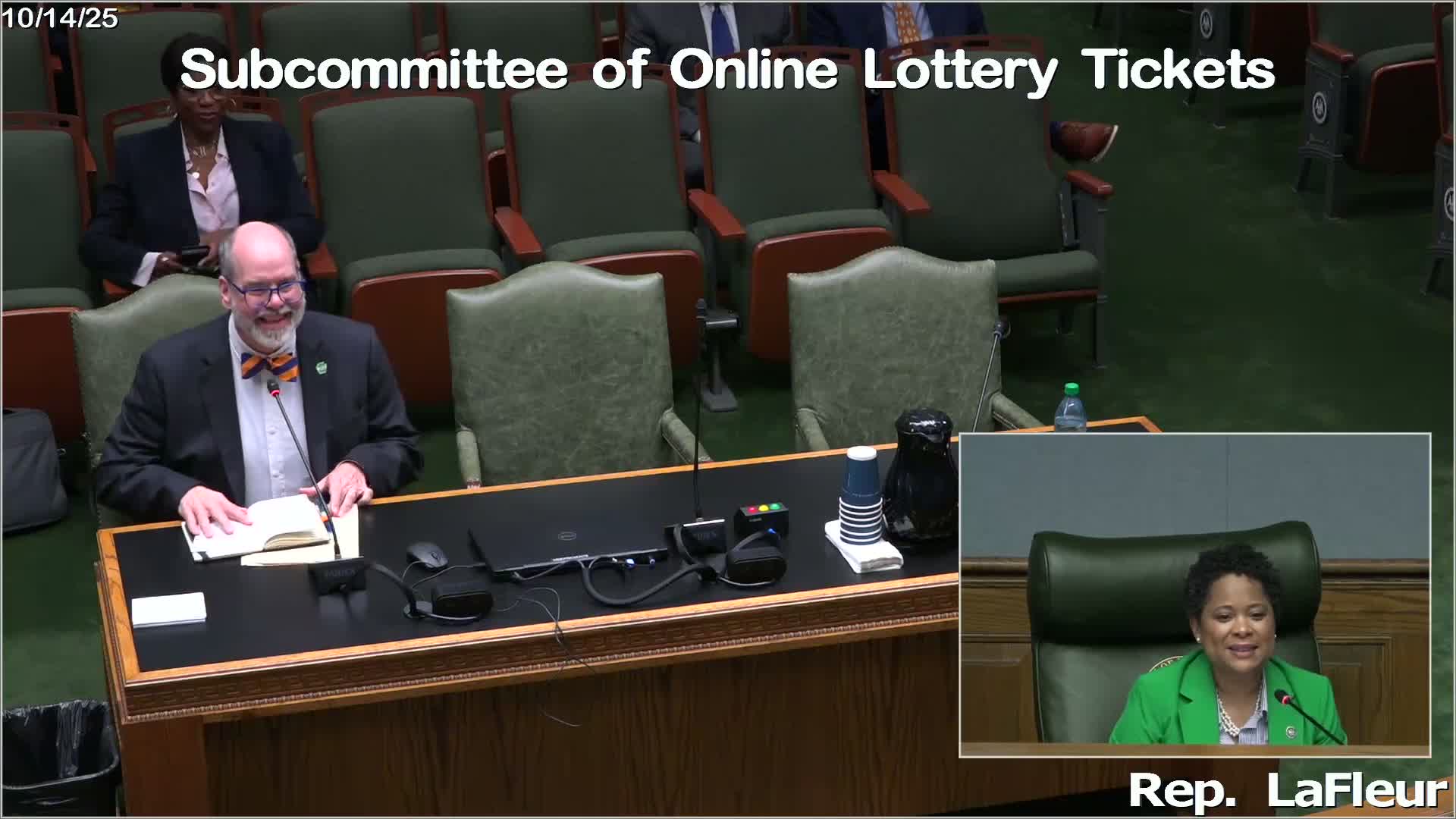House subcommittee studies feasibility of online lottery sales; Louisiana Lottery projects modest first-year return
Get AI-powered insights, summaries, and transcripts
Subscribe
Summary
The House Committee on Administrative Justice subcommittee convened Oct. 14 to study whether Louisiana should allow the sale of state lottery tickets online and heard testimony on projected revenue, retailer protections and responsible‑gaming safeguards.
The House Committee on Administrative Justice subcommittee convened Oct. 14 to study the feasibility, legal framework and potential revenue from selling state lottery tickets online, hearing testimony from the Louisiana Lottery Corporation, the Pennsylvania Lottery and private vendors.
The hearing, convened by Vice Chair Rep. LaFleur and attended by several committee members including Rep. Echols, Rep. Walters and Rep. Knox, focused on whether an “iLottery” program could increase and stabilize lottery revenues that fund K–12 education. Louisiana Lottery Director Rose Hudson told the committee the corporation has contributed more than $4.9 billion to the state’s Minimum Foundation Program since its founding and that online sales could modernize access to players who increasingly use mobile devices.
“The marketplace is changing,” Director Rose Hudson said. “To continue delivering strong results for Louisiana, we need to meet players where they are and offer experiences that reflect modern expectations while maintaining the security and trust that our players, retailers, and you count on.”
Why it matters: Lottery proceeds are a constitutionally designated funding stream for K–12 education in Louisiana. Witnesses emphasized iLottery could both add incremental revenue and reduce volatility tied to large jackpot games. Karen Fournette, Louisiana Lottery secretary-treasurer, told the committee recent year-to-year fluctuations were driven largely by jackpot swings and said online sales could help stabilize returns.
Revenue and timing: Director Hudson and vendor witnesses gave differing but broadly similar estimates for early revenue. The Louisiana Lottery provided an updated estimate of about $24.6 million return to the state in year one and projected cumulative returns of approximately $158 million over five years (year-by-year figures provided during testimony). Vendor witnesses gave comparable projections: Pollard Banknote estimated roughly $20 million in net gaming revenue in the first year; vendors and the lottery said implementation could take roughly nine to 12 months after procurement.
Examples from other states: Drew Svitko, executive director of the Pennsylvania Lottery, described Pennsylvania’s experience after launching iLottery in 2018. He said iLottery generated about $900 million in wagers there in recent years and did not reduce brick-and-mortar retail sales. Vendor witnesses pointed to Virginia and Pennsylvania as cases where online sales expanded total play and allowed targeted “omnichannel” promotions that drove players into stores.
Retailer concerns and compensation: Retailers’ possible loss of foot traffic and commission revenue was a recurring topic. Committee members noted many Louisiana retailers currently receive what was described in testimony as a nickel per dollar (5%) commission on in‑store sales. Pennsylvania and other witnesses described retailer-support strategies used elsewhere: affiliate/referral codes that credit retailers for online signups, “web cash” vouchers purchased in-store to fund online accounts, promotional coupons and higher-commission incentives tied to growth. Vendors and the Pennsylvania director said those measures, if designed into a Louisiana program, can direct online players back into retail.
Responsible gaming and consumer protections: Committee members pressed vendors and lottery staff about age verification, geolocation and problem‑gaming safeguards. Svitko and vendor witnesses described standard industry controls: KYC (know your customer) registration requiring identity elements (for example, last four digits of Social Security number or driver’s license), geolocation to ensure play occurs inside state borders, deposit/session limits, self‑exclusion and links to problem-gambling resources. Director Hudson said those measures and a problem‑gambling hotline would be part of any program.
“Because it is a digital footprint, you are able to introduce consumer‑protection programs,” said Chris Shaben of Aristocrat. “Players are no longer anonymous.”
Legal and statutory questions: Director Hudson told the committee that iLottery would require a change and clarification of existing law. She said Louisiana’s current criminal statute contains a prohibition on computer‑based gaming but noted prior legislative changes carved out exceptions for sports betting; iLottery would require a similar explicit statutory exception. Witnesses also told the committee that states studied did not provide a parish‑by‑parish opt‑in model for iLottery; if enacted in Louisiana it would operate statewide under the lottery’s authority unless the law stated otherwise.
Data ownership and analytics: Committee members asked who would control player and transaction data. Director Hudson said Louisiana Lottery would hold the lottery’s data and analytics. Vendor witnesses added that registered accounts allow lotteries to collect more granular data for responsible‑gaming monitoring and targeted retail promotions.
Public concerns: Testimony included skepticism from advocacy and industry groups. Kathleen Benfield of the Louisiana Family Forum urged caution and raised general objections to government‑operated gambling, questioned whether the problem‑gambling budget (cited in testimony as $500,000 yearly) was sufficient, and asked whether parish‑level votes should be required. Alton Ashi, representing the video‑poker industry, warned of advertising and credit‑card risks if online play expands.
Next steps: Directors and vendors agreed to provide committee staff with studies and sample legislation, including the Spectrum Gaming Group analysis referred to repeatedly in testimony. The subcommittee did not vote on any legislation; it adjourned after the presentations and discussion.
Ending: The subcommittee will collect the requested reports and draft materials to inform potential legislation in the 2026 regular session; no formal policy change occurred at the Oct. 14 meeting.
